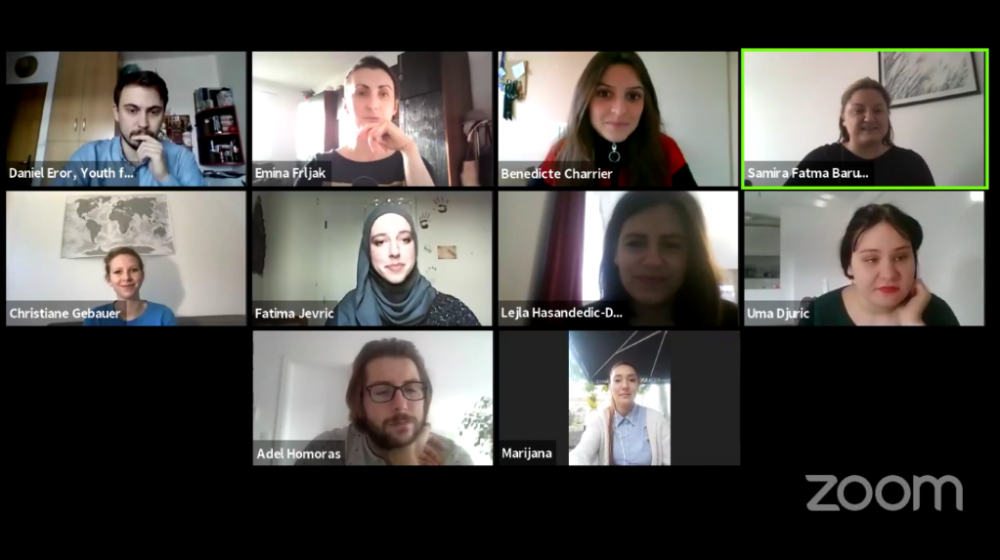Another panel discussion within the #ALTerHate campaign was held on October 28th, 2020 via the Zoom platform. The discussion focused on youth initiatives related to the fight against hate speech, but also the challenges they face in implementing their projects related to this topic. The #ALTerHate team invited speakers from 3 civil society organizations from Europe, more precisely from France, Italy, and Bosnia and Herzegovina. Besides them, one of the panelists was a participant of the #ALTerHate campaign, who, among other things, presented the campaign itself.
Benedicte Charrier, on behalf of Coexister, spoke about the initiatives but also the challenges that this organization faces in its work in the fight against hate speech in France, where the organization is based. Christiane Gebauer from World Student Christian Federation Europe spoke about the work of this organization in the field of combating hate speech at the European level, given that this organization has members and organizes activities throughout Europe. Uma Đurić attended a panel on behalf of the Small Steps, an organization based in Sarajevo, Bosnia and Herzegovina, and spoke about the fight against this phenomenon through the prism of discursive literacy in the context of the Balkans. Fatima Jevrić, the participant of the #ALTerHate campaign, spoke about the challenges of countering hate speech in the context of the reality of Bosnia and Herzegovina, as well as dealing with this phenomenon in the light of the violence and hate burdened past of Bosnia and Herzegovina.
 During the discussion, Christiane Gebauer said that „hate is not rational and one of the things we do, is educating people. But we can't just teach statistics, which would be easy probably, but that doesn't work, because we can't sit in an emotional discussion, which, hate speech always is, we can't sit there and refer to statistics. This works to a certain extent, but not until the very end. So what we also try to do, it put a focus on positive storytelling and on changing the narrative. We believe that this can really make a difference“.
During the discussion, Christiane Gebauer said that „hate is not rational and one of the things we do, is educating people. But we can't just teach statistics, which would be easy probably, but that doesn't work, because we can't sit in an emotional discussion, which, hate speech always is, we can't sit there and refer to statistics. This works to a certain extent, but not until the very end. So what we also try to do, it put a focus on positive storytelling and on changing the narrative. We believe that this can really make a difference“.
Uma Đurić emphasized that „a major challenge in countering hate speech in Western Balkans is the amount of media illiteracy. In order to deal with this challenge, it is important to recognize ideological discourse that from the offline move to the online space. Also, we should create educational models and tools that will help us to recognize hate speech and to deal with it. One of the tools is the program that promotes freedom and critical thinking in order to deal with media illiteracy and tackle hate speech, by providing alternative narratives“.
In her speech, Benedicte Charrier noted the following: „France is facing many issues these days when it comes to hate speech, freedom of speech, freedom of religion, and conviction. Until now the debate has become very binary, so either you're the oppressor, either you're the victim and people are having a hard time understanding that there is also a fair middle that we can all find and that we are all trying to at least make sure that there is the social cohesion that we can reach. It's very hard, but we are trying our best and at the time, as Coexister France we are really trying to take a position as an actor of peace and to give recommendations in terms of peace education and social inclusion because when it comes to hate speech we really believe that before anyone can actually post something or say something that would be super hateful, it's because they have the wrong background and that's where we want to act, we want to act where is the background why people want to act with so much hate“.
Fatima Jevrić, #ALTerHate participant, noted how „the dissolution of Yugoslavia caused intolerance and hatred between different ethnic groups. This war was the main reason for the emergence of hate speech. But, besides the war, there are also plenty of reasons which are managing to sustain hate speech today. One of the biggest reasons for sustaining hate speech today in BiH, Serbia, and Albania are in fact political elites“.
The presentation of the panelists was followed by a question session and an interesting discussion between the panelists and the participants.



